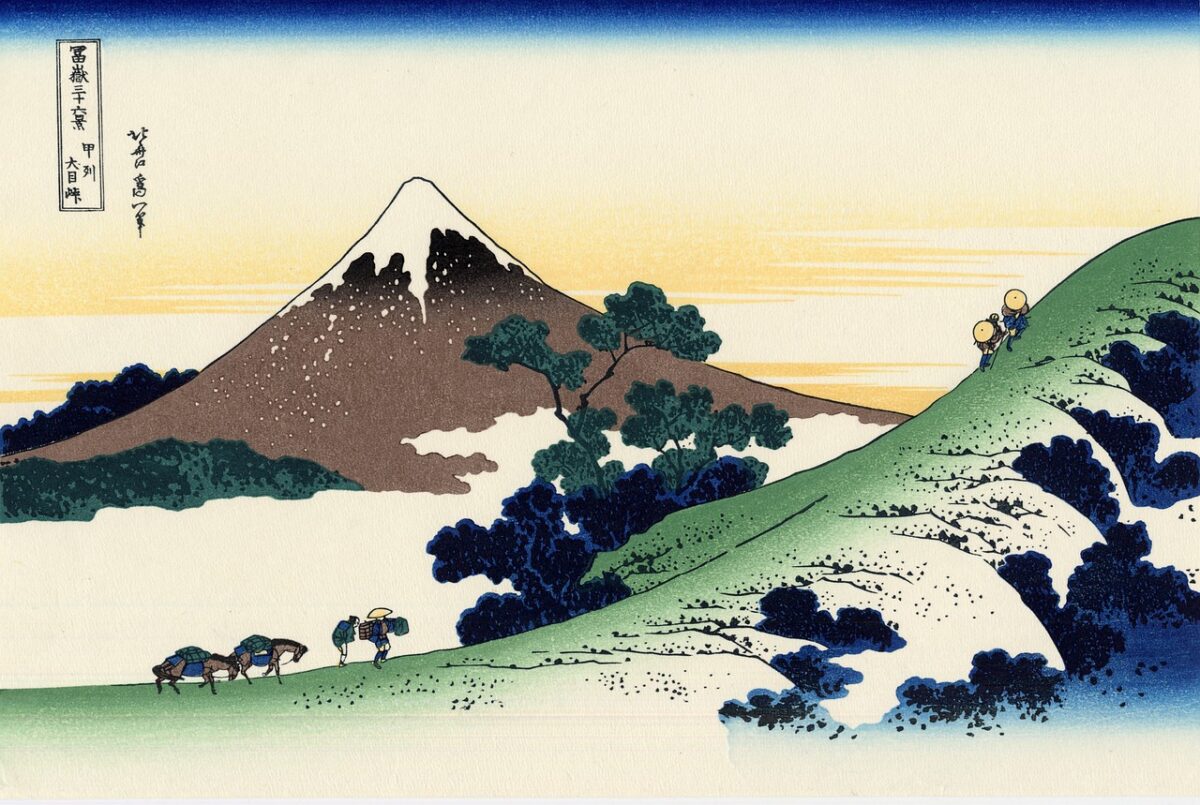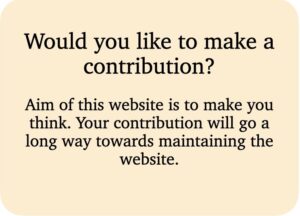I was in Seoul for a conference when I met a Japanese gentleman. We were having breakfast at the inn where both of us were staying. He could speak reasonably good English which made the conversation possible. He was a sketch artist and carried his sketchbook everywhere. Here’s what was peculiar about him.
He lived closed to Mount Fuji and every morning he would draw a sketch of the mountain. “Don’t you get tired of drawing the same thing everyday?”, I asked. “That’s the thing,” he said excitedly, “it’s not the same. Mount Fuji is different everyday. In winter there’s snow or fog; in summer the peak shines in bright sunlight. Every day, it’s a new mountain.” Then he showed me his sketches and indeed, they were different. And very well done.
Looking back, I realise what an extraordinary gift this gentleman had. To be able to look at life with fresh eyes every day. The one curse most of us have is that our dopamine levels hit a plateau very fast. If I lived next to Mount Fuji, I would probably stop noticing it in a few months.
I remembered this incident when I read the news about Gen Z ditching smartphones and opting for dumbphones. When you grow up with a powerful computing machine, you do not realise what life would look like without it. Those born earlier know it very well. Perhaps that is the reason why I am constantly amazed by the things one can do with a smartphone and internet. Imagine a monk from Umberto Eco’s The Name of the Rose who has spent his life in the castle where the library is locked and only a chosen few are allowed to read the manuscripts. If you transport this monk to a modern library, he would probably spend his whole life there reading and never come out.
Of course, only a small part of Gen Z are opting for dumbphones. Majority are using AI bots for various purposes. I will be selfish and restrict myself to one area that I am familiar with – writing. Students are routinely using chatbots to write essays. If you grow up with a chatbot that can spit out an essay on any topic with required length before you can say ‘snap’, how will the next generation learn to write? Writing well requires years of trial and error, how will the future writers prepare themselves? Will the era of writers working with their blood, sweat and tears slowly come to an end?
Another problem is the sheer volume of output. Chatbots can produce output at an unimaginable pace. Very soon the internet would be flooded with essays, reviews, and articles written by chatbots. And the next generation of chatbots would use this material as their input. I worry that this might produce material that will have less and less human input. Instead, we would have material written by the chatbots, for the chatbots with small human interaction in between. Essays written completely by humans would be lost in the tsunami of AI-generated content. What will this do to the future of internet?
It’s true that creative writing by AI is not yet upto the mark and one can identify the machine behind it. But this produces a false sense of security because we are used to comparing works of humans and we are applying the same criteria to AI. We can safely say that a human will take years to improve but a chatbot is improving itself every second. It is relentless, does not require sleep or motivation and can absorb a ginormous amount of input data instantly. So if AI lacks the spark in its creative writing today, it may acquire it next week or next month with a new iteration. It is learning to improve in a million ways literally every second of the day without stopping.
Human creativity is up against a competitor the likes of which have never been seen before.
One of the most frightening aspects of AI is that it is a black box. Even programmers who write the code do not know exactly how AI is improving itself. They can see the results and fine tune parameters, but no one knows exactly what goes on in the black box.
In related news, researchers say that AI bot is capable of insider trading and lying.
Speaking of writing by humans, a great article in Longreads about internet literature by Megan Marz. While discussing how critics have completely ignored online writing, Megan quotes the late Robert Silvers, a founding editor of The New York Review of Books,
[I]f one cares about language, if one cares about the sensibility in which language is expressed, and if one cares about the values that underlie our use of language . . . then these media, it would seem to me, should qualify as the subject of criticism. We seem at the edge of a vast, expanding ocean of words, an ocean growing without any critical perspective whatever being brought to bear on it. To me, as an editor, that seems an enormous absence.
Megan also points out the irony where blogs and other forms of online writing have been turned into books. As long as they were in digital form, critics ignored them entirely. Then they got published and voila! Like a frog transformed magically into a prince, they immediately attained legitimacy and were promptly reviewed by the critics. Megan discusses many other interesting points and you should read the original article in its entirety.
This got me thinking about internet writing. Let’s consider writing as an art vis-à-vis other art forms. A painter gets an idea, she goes to the studio and paints whatever she wants and then presents it to the public. A director gets an idea for a movie, assembles a team and makes a movie the way it is in his head. (The intereference of Hollywood studios in movie making has a long and well known history but for the sake of argument, let us assume that the director is free to make the movie as he wants.) We can extend the same paradigm to every other art form where an artist is more or less free to create, except writing. When you write an article or a novel or a nonfiction book, you need to go through an editor who supervises the work and changes it as needs be. Writer was the only artist who was not able to create freely whatever she wanted.
Internet writing changed that. Writing online, a writer was able to express himself freely without supervision; was able to experiment with form and style, at times producing content that would be unimaginable in the published form.
Internet writing brought the art of writing on par with other art forms, freeing the writer to create whatever she wanted, in a way that suited her muse.
Of course, this is not a criticism of conventional system of publishing with editors. They do a great job of collaborating with the authors, producing high quality content, hence the immense value of published books. Absence of editors in online writing freed the authors but it also brought a lot of variation in quality. One needs to search far and wide to find originality in the sea of digital words.
It is a conundrum that needs to be addressed. If that was a difficult task before, it has now become almost impossible when the internet is getting flooded with AI-generated content.
Narrator : So concludes the disconcerted author, nonplussed, and out of countenance, rattled by the rambunctious assaults of the digital world on the senses, where the brain is but a bewildered spectator, trying to navigate the labyrinthine web of shared reality, notwithstanding the physical world that lies underneath, for there is no physical reality and truth is a social construct…
Me : Who are you and where is the usual narrator? He was harsh but at least I could understand him.
Narrator : Oh, he is on vacation, he asked me to fill in for him.
Me : Do you always talk like this?
Narrator : When you say ‘like this’, you have in your mind a set paradigm, brought upon by millions of years of evolution that culminates in the brain going through this life; trying, in vain, to catagorize the jejune experiences into a coherent paradigm, only to observe the fragments of life getting shattered by the vicissitudes of time brought upon by…
Me : You know, you should record an hour of this and sell it as one of those calming audios that induce sleep. If you could get Morgan Freeman or Matthew McConaughey to read it, it will sell like hot cakes.
Narrator : Ah, the jejune mind, always reverting to crass capitalism..
Me : You seem to be rather fond of jejune…
Narrator : Indeed, it is the jejune of the quotidian life that sustains us, promising a better future but never delivering it, for what is life but a succession of jejune experiences of a simple Homo Sapiens Sapiens, carrying the ancient genes of yesteryears…
Me : Do you talk like this in real life?
Narrator : I used to but no more.
Me : What happened?
Narrator : Well, I borrowed a friend’s car and when he asked to return it, I tried to explain to him that truth was a social construct and the car is nothing but a projection of the metaphysical reality..
Me : How did that go?
Narrator : He snatched back his car keys, and ran for his life, and it was that experience that catapulted me to examine my life vis-à-vis the moral regulations that we impose upon ourselves, for what are those but a result of cultural conditioning, insofar as to advance a suitable narrative that will restructure our beliefs and rationalise our actions, actions that are sustainable insofar as to revitalise the jejune..
Me : Okay, we are done here. Read Hemingway.


